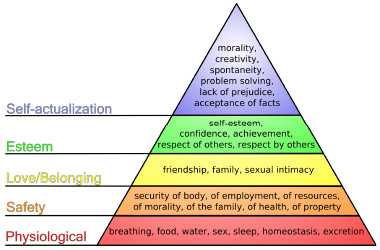
I’ve been reading Abraham Maslow (1908-1970). A “Behaviorist” psychologist, he is famous for his Hierarchy of Needs theory. The theory is pretty much explained by the illustration I show here. I will not delve deeper into his work other than to simply quote from Wikipedia:
“…(Maslow) generalized that, among other characteristics, self-actualizing people tend to focus on problems outside themselves; have a clear sense of what is true and what is false; are spontaneous and creative; and are not bound too strictly by social conventions.”

Conversely, one can logically conclude that those wallowing in the bottom of the triangle – in the survival strata – are caught up with their own selves, tend to approach life in a reactionary way and, without the courage or capacity to question, buy into social dictates that fit some personal need. (I qualify the above harsh description to those in the West whose fundamental survival-needs are pretty much met by the various societal safety nets. In the third world, basic survival can be a full-time occupation and so having the luxury to climb through Maslow’s Hierarchy of Needs strata is improbable).
The Hierarchy of Needs triangle is a fascinating observation of personal human needs, but put that aside for now and ask, what drives our needs? What powers us to seek survival, and once we obtain that, what drives us to further ascend Maslow’s hierarchy?
The answer is ludicrously simple – at first blush, almost laughable – but if you can get past that and viscerally grasp the answer to this question, it will have a powerful implication for your life. So, here I semi-humbly submit the absurdly simple answer: At the very deepest primal level, what constantly drives each of us is the yearning for something better than what we already have.
Look at your life and ask, what’s up next? Whatever it is, it almost certainly has to do with getting something you want that you don’t already have; something better.It’s this subliminal, constant yearning that drives each of us forward through the day and through life. This yearning is the fuel that powers our individual engines. Whether it is a desperate grasp for sheer survival or a long-term plod toward the highest pinnacle of self-actualization, each of us has a constant and powerful craving for something more than what we have now.
And before you scoff at this apparently simple-minded conclusion, ask yourself these equally elementary questions: Do you have a thought-out strategy to get what you want in your life? Presuming that gaining a better situation is important to you (100% of us) and that you do have a solid strategy (maybe 10% of us), do you constantly attend to the physical efficiency of your plan for obtaining the better situation? Do you tweak it and adjust it to changing conditions? Or, do you not have a plan and think you will arrive at this better place by sheer desire, the hand of God, the government, your family or that you will win the lottery or equally fanciful, believe that you are somehow inherently special and the world will someday wake up and recognize your hidden genius? Or maybe you think hard work all by itself will do the trick? Good luck. These fallbacks, including the hard work efforts, are short cuts and we know how short cuts turn out.
Instead, your inherent passion for a higher level of existence must be channeled properly: A proper plan must be established, the machinery must be made and kept efficient, and the big-mistake must be avoided.
Everyone yearns for something better yet very few follow a focused plan to get there. It’s a fact: Most people just ride along and take what comes, hoping for the best. They forgo methodical efforts to create a better life and instead, fritter away their inner passion with immediate-gratification diversions. Is this not simple-mindedness? Is this not the root of chronic personal frustration?
Hoping for the best is not enough. One must take physical, mechanical steps each day. They must be focused steps, with an even-handed approach that encourages efficiency and steers around roadblocks. The systems of the mechanical world must be constantly worked. You must do this for yourself. No one else will do it for you.
So, wanting to reach a better place in one’s life is a simple biological urge – a yearning – and this yearning is the fuel that will propel you to your life-goals if your engine is directed and efficient. It’s all about using your inherent yearning to fuel and manipulate the simple mechanics of the world you live in. Don’t get distracted by emotion or the unreasonable demands of others. Keep your head clear.
Focus on the goal. Make every move you make, count. Do the things you have to do whether you want to do them or not. Each day you are taking up space and time, and you are expending energy, so why not focus your daily space, time and energy to get what you want? Why float through the game of life like a feather in the wind? Root yourself. Pay attention. Take control!
What are the mechanical steps necessary to get what you want; to reach some degree of self-actualization? First, exactly choose your goals – in fact, write them down. Second, adopt black-and-white operating principles that are in line with your own deepest ethical beliefs, and then adapt each of them to reach the aforementioned goals. Write those down too. Third, specifically outline, and if appropriate, write down the necessary steps to reach your goals. And through all this, drop the airy-fairy idea that your emotional comportment will determine your success; that if you can reach some level of attitudinal purity everything will deservedly fall into place.
Deal with hard reality, whether it fits your preconceived notions or not. The emotional parts will happen – the joys and the sorrows – but they are not the root driving force and they will distract you. The foundational driving force is dispassionately mechanical and so is the world, and it is in perfecting these mechanics – in creating a high level of personal efficiency in the real world – that one succeeds in reaching life-goals. And smelling the roses has nothing to do with perfecting the mechanics. Don’t confuse one with the other. Get the mechanics in place in order to get your world functioning the way you want it to function. Smell the roses later or, at least, smell them judiciously as you work methodically toward your goals.
More simple-mindedness: There is nothing more satisfying in life than to set out to reach a goal and then actually reach it. So rise up through Maslow’s triangle understanding the ascending will occur because of your directed yearning, not because of attitude, mind-set, external largess or good luck. Harness the natural passion that drives you and then unemotionally “work” the physical mechanics of your life to create the results you want.
